On Sept. 1, 2020, Alameda County Superior Court Judge Brad Seligman ruled that the University of California (UC) could no longer use SAT and ACT scores for admissions. This past May, the UC system announced that the tests were optional for incoming applicants for various reasons, mostly due to Coronavirus. This raised concerns among students, parents, teachers and others involved in higher education.
In the last few years, schools across the country have began to consider omitting the application requirement of standardized test scores.
“More and more east coast and private schools became ‘test-optional’ a few years ago, so there’s been a movement in that direction for a while,” Counselor Laura Triantafyllos said.
This policy change has led schools to a holistic admissions approach. The holistic admissions process is known to look beyond test scores, with more emphasis on extracurriculars, the rigor of classes, grades, GPA, essays, and other factors when reviewing applications. Many schools have began implementing this practice into their admissions process to diversify admits. The removal of the SAT and ACT requirement will increase the use of this system.
College admissions tests have been identified by many as an “uneven playing field”. Students who come from wealthier families have access to tutors and some can even afford to retake the test to get a better score.
“Those with a higher socioeconomic status generally have had an advantage in that they have access to expensive test prep courses like Princeton Review,” said Triantafyllos.
Senior Kian Namaranian expressed that the purpose of taking either of the tests is to do well in order to apply to colleges and to show them your academic abilities.
“To do well on the ACT and SAT, you must pay for the test, study materials, and tutoring,” Namaranian said. “This poses a barrier to those who are not as wealthy.”
For years, the SAT and ACT have surfaced issues regarding fairness for all students. Private college counselor Stacy Colwell described the test requirement as “a discriminatory practice.”. Colwell believes that removing these tests may be somewhat of an equalizer within admissions in the future.
Namaranian, who was planning on taking the ACT, expressed that he feels indifferent regarding submitting scores or not. Colwell stated that the benefits students will gain from this decision is dependent on their situation. Colwell discussed this year’s applications.
“If you haven’t been the student that you have needed to be to get into the schools you aspire to go to, and you thought that you would have a great SAT or ACT score, you are probably at a disadvantage,” Colwell said.
Without the use of standardized test scores, other factors will weigh in heavily within applications.
“As for UC admissions, SAT and ACT scores were one out of the 14 factors that are reviewed for admission,” Triantafyllos said. “It seems as if it carried much more weight than the other 13 elements. This raised concerns surrounding fairness among students who do or do not submit test scores, while the policy was still test-optional.”
The UC admissions system wants to avoid this type of discrimination and has decided to take away the requirement altogether. Namaranian acknowledged that the decision to phase out the SAT and ACT requirement “is a step closer to a more fair and equal admissions process.”



























